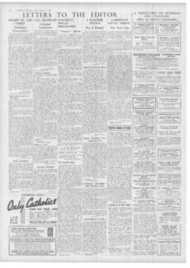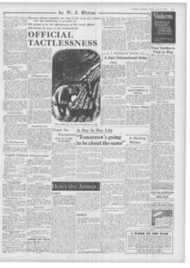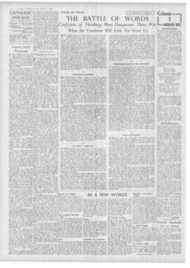Page 5, 23rd August 1940
Page 5

Report an error
Noticed an error on this page?If you've noticed an error in this article please click here to report it.
Tags
Share
Related articles
Irish Letter
Irish News Letter
Fresh Outbursts of Violence in Dublin and Belfast
From Our Own Correspondent At the moment when the air war has burst in full fury over Britain, violent events have broken out in Ireland, North and South.
In the capital, detectives who approached suspected premises—arms and a printing-press were found after the raid—were fired upon. One was killed and two others are not out of danger as I write. A gun-battle followed. Several prisoners were taken.
In Belfast, police who were pursuing a man were fired upon, and a battle took place, but there were no casualties or captures.
In Derry City, a taxi-driver was attacked by . armed men, and was carried prisoner while his car was used for a mysterious trip.
The Irish Government has made an emergency order to authorise courtmartials, and the death sentence, in certain circuinstances.
In County Cork, three aliens, who said they had come from France in a French vessel, were found in July in possession of bombs, explosives and Bank of England notes. It is announced now that they have been tried in camera and sentenced to seven years' penal servitude.
DE VALERA TELLS US ABOUT NEUTRALITY
Mr. de Valera has made his expected statement on neutrality by means of an American interview. He protested against those writers in America, a land devoted to democracy, who have advocated the seizure of the southern Irish ports by Britain ; and said that this came badly from Ireland's old friend. He ridiculed the notion that neutrality is an " extremist's " policy. Every party voted for it, and it was supported by the ultra-Conservative Irish Times.
The country could defend itself effectively ; but Partition created a danger within. Given a united Ireland. the country's security would be far greater. While Partition lasted there was the danger that " A " might commit aggression, and that " B " would come in.
For Ireland's future it was desired that there should be an international guarantee signed by Continental Powers, as well as Britain and America, that this island should be neutralised.
Unification would be best for all, here and now, but Ireland would not purchase her lost territory by surrendering her right to be neutral; she would not win soil by accepting servitude.
SENSATION IN BELFAST A Catholic doctor has been appointed in Belfast lately—a city which is one-third Catholic. Not one dispensary in the whole city has a Catholic doctor. Catholics, who value so much medical attention by physicians of their own faith, are denied it, as if the Penal age never had ended. The recent appointment of one Catholic doctor to a public infirmary has caused a sensation.
Meanwhile, at peaceful Virginia, by a lake in Cavan, the Rural Week was a feast of thought. The Papal Blessing was conveyed to the gathering. In sending it, Cardinal Maglione wrote of the Holy's Father's counsel that Catholic farmers are a strength to the nation.
DEMOCRACY HAS NOT FAILED, SAYS BISHOP The Bishop of Kilmore opened the proceedings. He did not agree that democracy had failed. If the people generally took an interest in Government the chances were that democracy would give good results. That was why he thought that the idea of Parish Councils was so promising. The Parish Council, Dr. Lyons said, should bring progress and improvement in its own parish, teaching it to utilise and develop whatever advantages it had had in its own area. They began to have a fine public spirit—practical parish patriotism—local indeed. but broadening into national patriotism.
It must be a deep source of satisfaction that the Government, supported in this moment of national emergency by all parties in the Oireachtas, had adopted the plan of parish committees.
He hoped that these parish committees would not expire at the end of the crisis.
PROFESSOR O'RAHILLY SLATES BUREAUCRACY Professor Alfred O'Rahilly, in another of the brilliant speeches of the week, said that Muintir na Tire was trying to go back to the Middle Ages when the Guilds were both religious and social. There were thousands of parish guilds in England as long ago as the thirteenth century. These guilds failed ultimately, for various reasons, but firstly because religion declined. When the gospel of money and greed came in such things died out.
" We have got to get rid," he declared, " of centralised bureaucracy. We have got to get back some of the faith and spirit that we had in the volunteer days. We have to stop counting heads. There is not as much in one head as another."
He believed that a central council for agriculture should be elected by diocesan guilds, directly or indirectly through the parish councils.
Agriculture was more than a vocation: it was a way of life. The small towns were a part of the life of rural Ireland. Their council should represent rural Ireland and be free of sectional interests. They had got to try to bring functional democracy back to Ireland. They were not anti-parliamentarians, but they could do things that parliament could not do.
blog comments powered by Disqus









